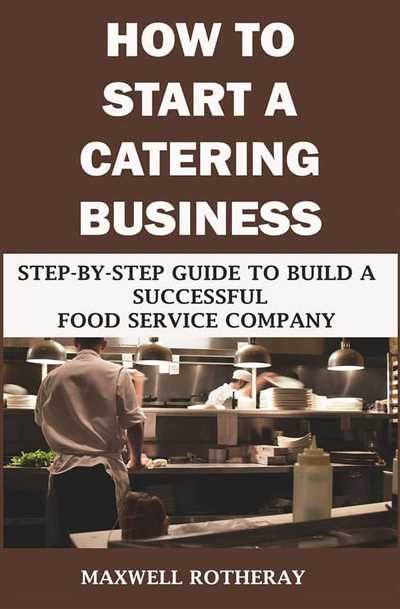
Are you looking to start your own catering business? If so, you’re in the right place! Building a successful catering business can be both challenging and rewarding, but with the right information and plan, you’ll be able to serve up delicious plates to your customers and clients.
Here are some key steps to get you started:
- Do your research: Before you start any business, it’s important to do thorough research. Find out who your competition is, what types of services they offer, and what sets you apart.
- Create a business plan: A well-thought-out business plan will help guide you through the process of starting and running your business. Include details about your target market, your marketing and advertising strategies, and any state laws and regulations you’ll need to comply with.
- Meet with local planners and event organizers: Networking with wedding planners and event organizers can help you find clients and build relationships with key partners in the industry. Attend social and networking events to get your name out there.
- Start small: You don’t need a commercial kitchen or fancy equipment to get started. Consider starting as a home-based caterer and offer your services for small events or parties. This will help you save money while you build your reputation.
- Get creative with your menu: Stand out from your competitors by offering unique and creative menu options. Consider different themes for weddings or outdoor events, and always be open to customizing your offerings based on your clients’ preferences.
- Learn from the experts: Take the time to learn from experienced caterers and industry professionals. Attend workshops and seminars, read books and articles, and seek advice from successful caterers. Their insights and advice can save you time and money in the long run.
- Market your business: A strong marketing strategy is key to attracting customers and growing your business. Use social media, online advertising, and word-of-mouth referrals to get the word out about your catering services. Consider offering special promotions or discounts to attract new customers.
- Gather reviews and testimonials: Positive reviews and testimonials can help build trust and credibility for your catering business. Ask your clients for feedback and encourage them to leave reviews on popular review sites like Yelp or Google. Highlight these reviews on your website and social media platforms.
- Don’t forget the details: When catering events, pay attention to the small details that make a big difference. Make sure you have enough chafing dishes and utensils, communicate effectively with your clients, and always deliver on your promises.
- Make money, but also enjoy the journey: Building and running a catering business can be challenging at times, but it should also be enjoyable. Take pride in your work, celebrate your successes, and don’t forget to have fun along the way!
With these steps and the right mindset, you can build a successful catering business that will satisfy customers and leave them hungry for more!
Written by: Goldschein Burnett, a writer for NerdWallet
How to Start a Catering Business in 9 Steps
Starting a catering business can be an exciting and rewarding venture. Whether you’re a seasoned cook or someone who just loves working with food, this guide will provide you with all the information you need to get started in the catering industry.
1. Determine the type of catering business you want to create. There are various types of catering, including social events, corporate functions, and outdoor gatherings. Decide where your interests and strengths lie and choose the type of catering that aligns with your skills and preferences.
2. Do thorough market research. Look into your local market and see what other caterers are offering. Explore their menus, prices, and services. Identify your competitors and find ways to differentiate yourself from them.
3. Create a business plan. A well-thought-out plan will help you set expectations, define your target market, and outline your marketing and advertising strategies. It will also serve as a roadmap for your business growth.
4. Determine your target market. Figure out who your ideal clients are and tailor your services to meet their needs. Consider factors like location, demographic, and event type to ensure your catering business attracts the right customers.
5. Build a network of partners and suppliers. Establish relationships with trusted vendors, such as food suppliers and rental companies. Collaborating with reliable partners will help you deliver high-quality services and make your clients’ events memorable.
6. Set up a home-based or commercial kitchen. Depending on the scale of your catering business, you can either work from your home kitchen or rent a commercial space. Make sure your kitchen meets all the necessary regulations and standards.
7. Hire a team you can trust. As your catering business grows, you may need additional hands on deck. Hire experienced cooks, servers, and event staff who share your passion for delivering exceptional food and service.
8. Market your catering services. Utilize various marketing channels like social media, word-of-mouth referrals, and online advertising to promote your business. Create a strong brand presence and showcase your expertise to attract potential clients.
9. Continuously learn and improve. Stay updated with the latest industry trends and continually enhance your skills. Seek advice from experienced caterers or join professional associations to learn from others in the field.
Starting a catering business requires hard work, dedication, and attention to detail. With the right plan and execution, you can build a successful catering business that will delight customers and make their events truly memorable.
Find your speciality
When starting a catering business, it’s important to find your specialty. This will help you stand out from the competition and attract customers who are looking for the specific services you offer.
Before you can find your specialty, you should do some research. Look at the market and see what types of events caterers in your area are serving. Are there any gaps that you could fill? Is there a demand for a specific type of cuisine or service that isn’t being met?
Once you’ve done your research, you can start to set yourself apart from the competition. Get creative and think about what unique services or dishes you could offer. For example, if you live in a state with a lot of weddings, you could specialize in wedding catering. Or if there are a lot of local events in your area, you could focus on catering for those.
It’s also important to consider your own skills and interests when choosing a specialty. What types of events or cuisines do you enjoy working with the most? Are there any specific dishes or cooking styles that you excel in? By choosing a specialty that aligns with your passion and expertise, you’ll be able to deliver the best possible service to your customers.
Once you’ve decided on your specialty, you can start to build your catering business around it. Research the laws and regulations that govern catering in your area, and make sure you have all the necessary permits and certifications. Create a website and social media presence to promote your services, and consider partnering with event planners or other vendors in your industry to expand your reach.
Don’t forget to seek out feedback and reviews from your clients. This will help you improve your services and build trust with potential customers. Pay attention to their expectations and be willing to go above and beyond to meet them.
Finally, when it comes to catering, presentation is key. Invest in high-quality chafing dishes, serving utensils, and other equipment that will make your food look as good as it tastes. Make sure you have all the resources and skills you need to give your clients a memorable dining experience.
In conclusion, finding your specialty is an essential step in building a successful catering business. By researching the market, being creative, and catering to your own skills and passions, you can create a unique and thriving business that will stand out from the competition. Good luck!
Written By Assistant
Researching customers and the competition

In order to build a successful catering business, it is essential to conduct thorough research on your customers and the competition. By understanding your target market and studying your competitors, you can make informed decisions and develop effective strategies to stand out in the market.
Here are 9 key steps to researching your customers and the competition:
| Step 1: Identify your target market Before you start planning your catering business, you need to determine who your customers will be. Are you targeting corporate clients, wedding planners, or social event caterers? Understanding your target market will help you tailor your services to meet their specific needs and expectations. |
| Step 2: Analyze your competitors Researching your competition is crucial to find out who they are, what services they offer, and how they market themselves. Look at their websites, social media presence, and customer reviews to gain insights into their strengths and weaknesses. This information will help you identify opportunities for differentiation and improvement. |
| Step 3: Learn from successful caterers Study successful caterers in your area or even beyond. Look at what they are doing right and how they have built their businesses. Look for advice from experts in the field, such as books or articles written by renowned caterers like Richard Goldschein or Patti J. Burnett. Their experiences can provide valuable insights and inspire you to implement effective strategies. |
| Step 4: Find your speciality In the catering business, it’s important to find your niche or speciality. Consider offering specific types of cuisine, such as vegan or gluten-free options, or focusing on a particular type of event, like weddings or corporate functions. This specialization will help you target a specific market segment and stand out from your competitors. |
| Step 5: Create a compelling website A strong online presence is essential in today’s digital world. Create a professional website that showcases your services, menus, and testimonials. Make sure your website is user-friendly and visually appealing. Invest in high-quality photography and provide detailed information about your offerings. |
| Step 6: Offer creative and customizable menus One way to attract and retain customers is by offering creative and customizable menus. Keep up with the latest food trends and experiment with new dishes. Consider dietary restrictions and preferences, and offer menu options that cater to different needs. Providing a personalized experience will set you apart. |
| Step 7: Understand the rules and regulations Make sure you are familiar with the laws and regulations governing the catering industry in your area. This includes food safety and hygiene standards, licensing requirements, and any specific regulations for serving alcohol. Complying with these rules will help you build trust with your customers and avoid legal issues. |
| Step 8: Invest in marketing and advertising Once you have established your catering business, you need to invest in marketing and advertising to reach your target market. This can include online advertising, social media campaigns, print materials such as brochures and business cards, and participation in industry events and trade shows. Develop a comprehensive marketing plan to promote your services effectively. |
| Step 9: Keep up with industry trends The catering industry is constantly evolving, so it’s important to stay updated with the latest trends and developments. Attend industry conferences, network with other professionals, and subscribe to industry publications. This will help you stay competitive and adapt your services to meet the changing needs and preferences of your customers. |
By following these steps and conducting thorough research on your customers and the competition, you will be well-equipped to build a successful catering business that meets the needs of your target market and stands out in a competitive market.
Know Home-Based Catering Laws

When starting a home-based catering business, it is crucial to understand the laws and regulations that govern this type of specialty service. Knowing the legal requirements will help you navigate the competitive catering market and ensure you provide your customers with the best service possible.
Home-based catering laws can vary from state to state, so it is important to research and learn about the specific regulations that apply to your area. This information will give you the details you need to set up and operate your catering business legally and safely.
In some states, home-based caterers are only allowed to serve food at specific events or functions, such as weddings or social gatherings. Other states may have more lenient laws that allow you to offer your services to a wider range of customers.
No matter the laws in your state, it is essential to have a commercial-grade kitchen. This means that you must meet certain standards for food storage, preparation, and cleanliness. These regulations are put in place to protect the public from foodborne illnesses and ensure that your customers can trust the quality of your offerings.
Additionally, home-based caterers may need to obtain the necessary permits and licenses to operate legally. These permits will vary depending on your location and the types of events you plan to cater. It is essential to contact your local health department or regulatory agency to find out what permits and licenses you need to acquire.
Working with local partners, like trusted suppliers or other catering businesses, may also help you navigate the complexities of home-based catering laws. By building relationships with these partners, you can gain valuable advice and knowledge about the local market, competition, and customer expectations.
Before starting your home-based catering business, consider creating a website to showcase your services and attract potential customers. A well-designed and informative website will make it easier for customers to find and trust your business. Use this platform to highlight your specialties, showcase your previous work, and give details about the types of events you can cater.
Marketing your home-based catering business can be challenging, but with the right strategies, you can reach your target audience effectively. Utilize social media platforms to promote your services, engage with customers, and share photos of your delicious plates. You could even offer discounts or promotions to attract new customers and encourage repeat business.
Remember, as a home-based caterer, you are competing with not only other home-based caterers but also established commercial catering companies. While you may have lower overhead costs, you must still provide the same level of professionalism and quality to compete in the market.
By knowing and abiding by the home-based catering laws, you will be well on your way to building a successful catering business. Take the time to learn about the regulations in your state, establish a strong online presence, and consistently deliver exceptional service. With perseverance and dedication, you can make your home-based catering business thrive.
Set expectations and build trust
When starting a catering business, it’s important to set clear expectations with your clients. This will help ensure that your customers know exactly what to expect when working with you.
One of the first things you’ll need to do is provide them with information about your services. Let them know what types of events you specialize in and the types of dishes you offer. Whether it’s a wedding or a corporate event, make sure your clients understand the range of services you can provide.
Building trust is crucial in the catering industry. Your clients need to feel confident that you can deliver on your promises and provide a high level of service. One way to build trust is to give them a sense of your experience and expertise. Let them know how long you’ve been in business and any specific certifications or qualifications you have.
Another way to build trust is to provide them with as much information as possible. Be transparent about your pricing, including any additional costs that may arise. Give them a detailed breakdown of what they can expect from your services, such as the number of staff members who will be present and the types of equipment you’ll use.
It’s also important to be upfront about any rules or regulations that may apply. Catering businesses typically need to comply with health and safety laws, so make sure your clients understand any restrictions or guidelines that may impact their event.
Finally, take the time to listen to your clients and their needs. Offer advice and guidance based on your expertise, but also be open to their input and ideas. Building a strong relationship with your clients will help to ensure their satisfaction and increase the likelihood of repeat business or positive reviews.
In a competitive market, catering businesses need to find creative ways to stand out. Researching your competitors and understanding the local market can help you identify gaps or opportunities. Look for ways to differentiate your services, whether it’s through unique dishes or speciality offerings.
Building trust with your clients is key to success in the catering business. By setting clear expectations, providing transparent information, and offering exceptional service, you can establish a strong reputation and build long-term relationships with your customers.
| Researching | Marketing | Advertising |
|---|---|---|
| Research your local market and competitors | Develop a marketing strategy to reach your target customers | Advertise your services through online platforms, social media, and local advertising channels |
| Read reviews and testimonials | Create a strong online presence through a website or social media profiles | Partner with other local businesses or event planners |
| Learn from other successful caterers | Offer promotions or discounts to attract new customers | Build partnerships with venues or other event-related businesses |
| Utilize online resources and communities | Attend local events or trade shows to showcase your services | Stay updated on current catering trends and industry news |
| Stay up to date with industry trends and regulations | Collect and showcase positive customer reviews | Collaborate with local influencers or bloggers |
| Continuously improve and expand your menu and offerings | Provide excellent customer service and follow-up with clients | Offer special promotions or packages for specific events or seasons |








